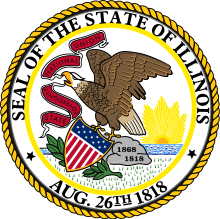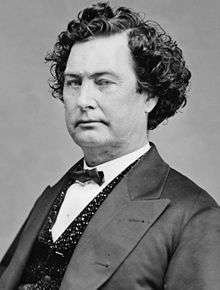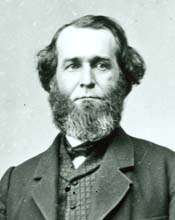1860 Illinois gubernatorial election
The Illinois gubernatorial election of 1860 was the twelfth election for this office. Republican governor William Henry Bissell died early in his term, and incumbent governor John Wood did not seek re-election. Former Democratic Congressman and former Clerk of the U.S. House James C. Allen was the Democratic nominee.[1] A Number of third-party candidates ran as well; none received over one percent of the vote. At this time in Illinois history the Lieutenant Governor was elected on a separate ballot from the governor. This would remain the case until the adoption of the 1970 constitution.
| |||||||||||||||||
| |||||||||||||||||
 County Results | |||||||||||||||||
| |||||||||||||||||
Results
| Party | Candidate | Votes | % | ± | |
|---|---|---|---|---|---|
| Republican | Richard Yates | 172,196 | 51.15% | +4.22% | |
| Democratic | James C. Allen | 159,253 | 47.34% | +2.35% | |
| Independent | Thomas Hope | 2,049 | 0.61% | N/A | |
| Constitutional Union | John T. Stuart | 1,626 | 0.48% | N/A | |
| Independent | J. W. Chickering | 1,148 | 0.34% | N/A | |
| Independent | William Brown | 68 | 0.02% | N/A | |
| Independent | John Hassack | 46 | 0.01% | N/A | |
| Independent | Scattering | 17 | 0.01% | N/A | |
| Majority | 12,943 | 3.85% | -6.77% | ||
| Turnout | 336,403 | 100.00% | |||
| Republican hold | Swing | ||||
gollark: Electron apps are basically just entire giant Chrome instances for one app. It's hilariously wasteful.
gollark: Is it though? Is it really?
gollark: Basically fine as long as you do not do it infinitely.
gollark: On NIs it'll always be on the back anyway, so that's not massively relevant. I might just have gotten the type wrong.
gollark: On what, the turtle or NI?
References
- "Our Campaigns - IL Governor Race - Nov 06, 1860". www.ourcampaigns.com. Retrieved 2019-01-04.
- Illinois Blue Book 1899
- The Political Graveyard
| Elections in Illinois | ||||||||||
|---|---|---|---|---|---|---|---|---|---|---|
 | ||||||||||
|
||||||||||
|
||||||||||
|
||||||||||
This article is issued from Wikipedia. The text is licensed under Creative Commons - Attribution - Sharealike. Additional terms may apply for the media files.

